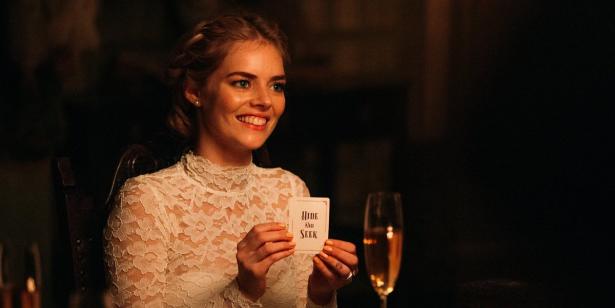At first it seems like an unhappy coincidence, the way that Alex Le Domas (Mark O’Brien) bears a slight resemblance to presidential in-law Jared Kushner: pale, with over-coiffed hair, barely concealing an expression of discomfort. (Not quite as striking as Kushner’s resemblance to murderous boy-doll Brahms, but close enough.) Alex puts up a more convincingly affable front, bantering with his bride-to-be Grace (Samara Weaving) on their wedding day and grumbling apologetically about inflicting his lousy family on her. But there’s clearly something sinister (or knowledge of same) behind his worried eyes.
His family’s empire—or “dominion,” as he half-jokingly corrects Grace—is not real estate but gaming. The Le Domas clan went from printing playing cards to producing board games to owning sports franchises, and their imperious old money is what Grace thinks accounts for the scowling, unforgiving visages that surround her before and during the wedding ceremony. Grace, for her part, is a foster kid (though the movie doesn’t explain why she doesn’t appear to have any friends), and eager to fit into Alex’s family, even if they are a bunch of sour-faced rotters.
Grace’s longing for family makes her particularly amenable when Alex explains one of his family’s stranger rituals: After the wedding, held at the family estate, Grace must draw a card and play whatever game is inscribed upon it. When she pulls hide and seek, Alex’s face falls. As Grace gamely heads off to find a hiding spot, Alex watches as his depressed lush of a brother, Daniel (Adam Brody), seemingly approachable mother Becky (Andie MacDowell), and domineering father Tony (Henry Czerny), along with the rest of the family, gather a variety of weapons. They intend to hunt down their new in-law, wound her, capture her, and perform a ritual killing that will supposedly allow them to retain their wealth and power. At one point, one of the characters lets loose a faux-deadpan cliché: “It’s true. The rich are different.”
As a blackly comic satire of immoral one-percenters, Ready Or Not is not particularly insightful (another sample barb: “Fucking rich people!”), and not especially witty. It’s the kind of genre movie that seems to think that its characters sputtering out profanities is, on some level, a transgressive act unto itself, and that the gruesome slapstick of its death scenes are just crimson-hued gravy. But the filmmakers do have a clever idea about how to level the playing field when the hunt begins: The Le Domas family may be wealthy, powerful, evil, and ruthless, but they are also pointedly, sometimes fatally incompetent. This planned sacrifice is only an occasional ritual, which means they’re rusty on the specifics. Collectively, they spend a lot of time arguing over which rules of the tradition are truly necessary (are only old-timey weapons allowable? What about surveillance cameras?) and YouTubing instructional crossbow videos.

Her moment of hesitation lends some nuance to a movie that generally hurtles forward, toward gory kills, near misses, and the inevitable crossbow mishaps. Given the quick pace, it’s surprising to realize that the filmmakers aren’t more eager to cut to elaborate chases. The multi-room mansion seems custom-built for set pieces, but while there are a few memorably tense and/or gruesome sequences, Ready Or Not is both plottier and talkier than necessary. At least it looks great: The colors and shadows of Brett Jutkiewicz’s cinematography are rich and saturated, an uncommonly convincing digital imitation of film.
It’s a little disconcerting that the film’s women have higher instances of both caricature and punchline deaths than the men; the one family member afforded some dimension and even pathos is the sardonic, quietly despairing Daniel, well-played by Brody. The charitable reading is that Ready Or Not understands how moneyed entitlement knows no gender—that the only way to break the arbitrary yet destructive grasp of the super-rich is to chop it off, or possibly light it on fire. So no, not a subtle movie. But a fairly satisfying one.


Spread the word